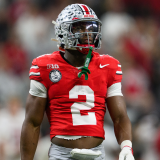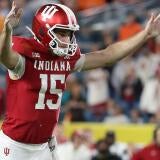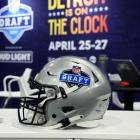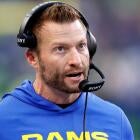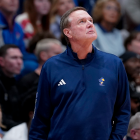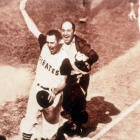2024 NFL Draft: What happens in April? Inside what NFL teams do in the weeks leading up to the draft
The final stretch is important for several reasons

Many aspects of the NFL Draft process for NFL clubs are no longer secret for those not in the league.
After the college football season ends in January, NFL clubs meet in preparation for the all-star games in late January, then meet again before the NFL Scouting Combine in late February, followed by the nationwide travels of the Pro Day circuit throughout March.
But what do teams do in April? The answer is both a lot and a little. It's both uniform and differs between teams.
Here's a bit of the different tasks and focuses NFL teams do as we work towards the culmination of the draft process: NFL Draft weekend.
Reviewing workout warriors and late-round/priority free agent players
The major benefit of the NFL Combine for clubs is simply that it hosts so many players in a uniform setting. NFL teams can leave feeling fairly good about more than 300 players all in one place, with most, if not all, of their scouts and coaches.
But for pro days, NFL clubs are spread across the country, sometimes at seven or more different pro days at once. While people outside the league can benefit from leaks of pro day results to start reviewing and assessing these guys, for many teams, pro day month is data collection, and April can be the first time to actually start making sense of the numbers.
Teams differ on how they process "workout warriors," or players who either tested far better than expected or weren't on the radar at all, but now warrant review. Sometimes, it's area scouts diving back in and updating reports. For others, it can be at the director level as the pro day results come in.
That results in one of, in my opinion, the few benefits of the pro day circuit. The "workout warriors" end up standing out so much that not only are directors, coaches and executives watching or rewatching their film, but they're watching it less than a month before they start actually using their draft picks.
Finalizing the late-round/priority free agent board
For a large majority of the scouting staff, it's Day 3 and after the draft that they get to really have substantial impact on who their teams take.
Some teams will have individual area scout meetings about players graded here, while others will put all their scouts in the same room, put some film on, and let area scouts present and advocate for these players in front of the entire staff. This usually happens a week or two after Pro Days are over.
This process generally results in the idea of the smaller draft board, as it weeds out players at the area scout, directors and GMs, and maybe coaches all value as many not early round picks, but guys they want. And the others are players that they'll likely start preparing for priority free agents for (more on that later).
Final private visits and local days
Teams greatly differ on how they prioritize their private workouts or "top-30 visits" as they've become known.
Some teams view this as a chance to bring in the players they are most likely to draft, others bring in the players who may have the most on- or off-field questions, and others yet may bring in players for their own personal (and sometimes strategic) reasons. The last day for teams to bring in players for a private workout is April 17.
Every NFL team is also permitted to have a "local day," where it can invite players with a local tie to its team (nearby colleges, player's hometown, etc.) to work out in a team-run pro day in early April.
Lastly, there are some remaining pro days for players who weren't able to test due to injury at the combine or their pro day. This year, some notable player pro days are:
- April 10: Amarius Mims/Brock Bowers (Georgia)
- April 15: Cooper DeJean (Iowa) and Khristian Boyd (Northern Iowa)
- April 16: Johnny Newton (Illinois)
Offseason workouts can begin
For teams with new head coaches, they can finally start working with their players on April 1, right after the pro day circuit. For teams with returning head coaches, they can begin on April 15.
This generally doesn't play a major role in draft decisions, but for a new head coach, it can at times crystalize which positions you feel are most in need of depth and competition.
Finalizing the board and coach involvement
Depending on the team structure, a team's coaches are involved throughout the NFL offseason, whether it be watching players, writing reports and/or traveling to pro days.
But due to the nature of the offseason, coaches can at times be thrust into the draft process without enough time to make their opinions and voices heard enough compared to scouts.
Position and special teams coaches can really start to shift the discussion with their head coach and general manager into scheme fit, body types, and exact roles their current roster may need to be filled.
After final position coach and coordinator -- as well as scout -- feedback, most teams then begin to have more closed door, smaller group meetings about two weeks before the draft to really "finalize" the big board.
For some teams, the board may change substantially in areas after assessing all the information from their staffs as well as interjecting their own viewpoints (it is, after all, the GM and head coach who the board's accuracy rests on). For others, it's more of taking a few days to refresh and make sure there's proper perspective.
Assessing the trade market
Alongside many of these April priorities, general mangers and members of their football administration/analytics teams will start to flesh out potential trades.
Every team has their own way of weighing draft picks and assessing good "value" in trades. They'll call other teams, seeing which picks, not only in the first round but in the second and even later rounds, may be available and at what cost.
There are times when trades can even be "agreed in principle" well before the draft, giving both GMs some idea of structure before the clock starts on draft day.
Ensuring they have correct draft weekend information
We hear stories seemingly every year of phone issues, busy signals and miscommunication as teams are calling players to select them. This job of making sure every possible player a team may draft has their information updated and ready to go is a small, administrative task that is one of the final aspects of being "ready" for draft week.
Teams may also make sure they have all updated medical information and any rechecks done, as well as make any final calls to schools or people familiar with players if they have lingering character questions. That way, they can dot the i's and cross the t's for every player.
Finally, NFL area scouts and football administration staff will start calling potential Day 3 or priority free agents. This "recruiting process" begins as early as a few weeks before the draft and runs right through Day 3 of draft weekend.
It's always a consistent back and forth of scouts saying, "We really want you here in [Team X]" and players and their agents saying, "Well if you want us, draft us!" But often times, these recruiting pitches are to make sure the player, who may have many options if not drafted, can see exactly his path towards making the team's roster.
April's level of businesses, travel and workload differs from team to team, but largely it's a time to focus on data analysis (rather than collection) and ensure proper perceptive and organization, resulting in what hopefully is a well-built strategy and draft board as the culmination of 12 months of preparation.
In the end, every team enters April with great information, starts the NFL Draft with a plan, and hopefully leaves April with a draft class worthy of the time spent by the entire scouting, coaching and administration.
And then, they start all over again for the 2025 NFL Draft.



